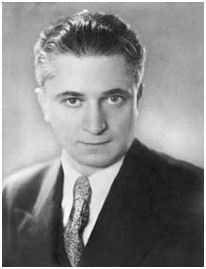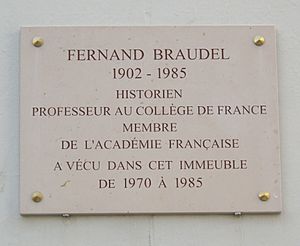Fernand Braudel facts for kids
Quick facts for kids
Fernand Paul Achille Braudel
|
|
|---|---|
 |
|
| Born | 24 August 1902 Luméville-en-Ornois, France
|
| Died | 27 November 1985 (aged 83) Cluses, France
|
| Occupation | Historian |
Fernand Braudel (born August 24, 1902 – died November 27, 1985) was a famous French historian. He was a key leader of the Annales School, a group of historians.
Braudel's work focused on three big projects. These were The Mediterranean, Civilization and Capitalism, and The Identity of France. He believed that large-scale social and economic factors were very important in shaping history. He also helped develop ideas that led to world-systems theory.
Contents
About Fernand Braudel's Life
Fernand Braudel was born in Luméville-en-Ornois, France. When he was seven, his family moved to Paris. His father, who was good at math, helped him with his studies. Braudel also learned a lot of Latin and some Greek.
He studied at the Lycée Voltaire and the University of Paris. At age 20, he earned a history degree. From 1923 to 1932, he taught at the University of Algiers. There, he became very interested in the Mediterranean Sea. He wrote papers about Spain's presence in Algeria in the 16th century. He also started his PhD on the foreign policy of King Philip II of Spain.
From 1932 to 1935, Braudel taught in high schools in Paris. In 1934, he helped create the new University of São Paulo in Brazil. He later said his time in Brazil was the "greatest period of his life."
In 1937, Braudel met Lucien Febvre on a ship returning to Paris. Febvre was a co-founder of the important Annales journal. Around 1938, Braudel joined the Annales School. He also became a history instructor at the École pratique des hautes études. Febvre helped him with his main work, The Mediterranean.
Braudel's Time as a Prisoner of War
In 1939, Braudel joined the military for World War II. In 1940, German soldiers captured him. He was held in a POW camp in Mainz from 1940 to 1942. Then he moved to a camp near Lübeck for the rest of the war.
While in the camp, Braudel wrote his famous book, The Mediterranean and the Mediterranean World in the Age of Philip II. He did this without his notes or books. He relied only on his amazing memory and a local library.
After the War: Leading the Annales School
After 1945, Braudel became the leader of the second generation of Annales historians. In 1947, he helped create the Sixième Section for "Economic and social sciences." This was at the Ecole Pratique des Hautes Etudes. He received money from the Rockefeller Foundation and later the Ford Foundation.
In 1962, he helped create the Fondation Maison des Sciences de l'Homme (FMSH). He led this foundation from 1970 until his death. FMSH helped spread the Annales way of thinking about history around the world.
In 1949, Braudel was chosen to join the Collège de France. He also helped start the academic journal, Revue économique, in 1950. He retired in 1968. In 1983, he became a member of the Académie française.
Understanding The Mediterranean
Braudel's first book, The Mediterranean and the Mediterranean World in the Age of Philip II, was very important. It changed how many historians thought about history.
Braudel believed there wasn't just one Mediterranean Sea. He saw it as a huge, complex area where people lived, traveled, and fought. He showed that the sea was connected to the plains and mountains around it. Life in these areas was very different.
Time in History: Braudel's View
Braudel looked at history in three different ways, based on how fast things change:
- Geographical Time: This is the slowest kind of change. It's about the environment, like mountains or deserts. These changes happen over a very long time, almost without anyone noticing.
- Social and Economic Time: This level looks at changes in society, economy, and culture. These changes are faster than geographical ones. Braudel might look at two or three centuries to see patterns, like the rise and fall of rich families.
- Event-Based Time: This is the fastest level of time. It's about specific events and the actions of individuals, like kings or battles. Braudel thought this was the least important level for understanding deep history.
Braudel's book used ideas from other social sciences. It focused on the longue durée, which means "long duration." This way of thinking played down the importance of single events. Instead, it stressed slow, long-term changes. This book made the Annales School famous worldwide.
Exploring Capitalism
After The Mediterranean, Braudel's next big work was Civilization and Capitalism, 15th-18th Century. This three-volume series looked at the pre-industrial world in great detail. It focused on how everyday people made economies work.
Braudel mixed traditional economic ideas with detailed descriptions of daily life. He wrote about how economic events affected things like food, fashion, and other social customs. He also explored how Western capitalism influenced the rest of the world. He wrote this series to explain the modern world and to offer a different view from Marxist ideas about history.
Cycles and Structures in Capitalism
Braudel talked about long-term cycles in the capitalist economy. He saw these cycles starting in Europe in the 12th century. Different cities and countries took turns being the centers of these cycles. For example, Venice was important from the 13th to 15th centuries. Later, Amsterdam and London became centers.
He used the word "structures" to describe organized behaviors, attitudes, and ways of life. These included physical things like buildings and roads. He believed that the structures built in Europe during the Middle Ages helped European cultures succeed later. He thought the independence of city-states was very important for this.
Braudel also argued that capitalists were often monopolists, not just people competing in free markets. He believed they tried to control things and didn't always use free markets. He also suggested that governments in capitalist countries often helped these monopolists.
The Identity of France
Braudel's last book was L'Identité de la France (The Identity of France). He didn't finish it before he died. In this book, he showed his deep love for France.
He argued that France was shaped more by its geography and culture than by its politics or economy. He explored this idea by looking at the country's history over centuries and thousands of years. Braudel believed in a "deep France" (la France profonde). This was based on the way peasants thought and lived. He felt this way of life had survived through all the changes in French history.
How Braudel Changed History Writing
Braudel believed that before the Annales approach, history writing focused too much on short periods and specific events.
His followers admired his use of the longue durée approach. This stressed the slow effects of geography, climate, and technology on people in the past. The Annales historians had lived through two world wars. They didn't like the idea that history was just a series of sudden changes.
They preferred to focus on things that stayed the same over long periods. They argued that the deepest parts of society were central to history. Big changes in governments or social life were less important. They believed history was beyond the control of individuals, even revolutionaries. Braudel also disagreed with the Marxist idea that history should be used to start revolutions.
Awards and Honors
Honorary Degrees
- Université libre de Bruxelles
- University of Cambridge
- University of Chicago
- University of Cologne
- University of Geneva
- Leiden University
- University of Oxford
- University of Padua
- Complutense University of Madrid
- Université de Montréal
- University of Warsaw
- Yale University
Orders of Merit
- Commander of the Legion of Honour
- Commander of the Ordre des Palmes académiques
Learned Societies
- Member of the Académie française
- Member of the American Academy of Arts and Sciences
- Member of the Bavarian Academy of Sciences and Humanities
- Member of the Heidelberg Academy of Sciences and Humanities
- Member of the Hungarian Academy of Sciences
- Member of the Serbian Academy of Sciences and Arts
Legacy
There is a Fernand Braudel Center at Binghamton University in New York. Also, the Instituto Fernand Braudel de Economia Mundial is in São Paulo, Brazil.
In a 2011 poll by History Today magazine, Fernand Braudel was chosen as the most important historian of the past 60 years.
Main Publications
- La Méditerranée et le Monde Méditerranéen a l'époque de Philippe II, 3 vols. (first published in 1949; revised many times)
- vol. 1: La part du milieu ISBN: 2-253-06168-9
- vol. 2: Destins collectifs et mouvements d'ensemble ISBN: 2-253-06169-7
- vol. 3: Les événements, la politique et les hommes ISBN: 2-253-06170-0
- The Mediterranean and the Mediterranean World in the Age of Philip II. 2 vols. (second revised edition, translated 1972 and 1973 by Sian Reynolds) excerpt and text search vol 1; excerpt and text search vol 2
- Ecrits sur l'Histoire (1969) ISBN: 2-08-081023-5
- Civilisation matérielle, économie et capitalisme, XVe-XVIIIe siècle
- vol. 1: Les structures du quotidien (1967) ISBN: 2-253-06455-6
- vol. 2: Les jeux de l'échange (1979) ISBN: 2-253-06456-4
- vol. 3: Le temps du monde (1979) ISBN: 2-253-06457-2
- Civilization and Capitalism, 15th–18th Century, translated by Siân Reynolds, 3 vols. (1979)
- vol. 1: The Structures of Everyday Life ISBN: 0-06-014845-4
- vol. 2: The Wheels of Commerce ISBN: 0-06-015091-2
- vol. 3: The Perspective of the World ISBN: 0-06-015317-2
- On History (1980; English translation of Ecrits sur l'Histoire by Siân Reynolds)
- La Dynamique du Capitalisme (1985) ISBN: 2-08-081192-4
- L'Identité de la France (1986)
- The Identity of France (1988–1990)
- vol. 1: History and Environment ISBN: 0-06-016021-7
- vol. 2: People and Production ISBN: 0-06-016212-0
- Ecrits sur l'Histoire II (1990) ISBN: 2-08-081304-8
- Out of Italy, 1450–1650 (1991)
- A History of Civilizations (1995)
- Les mémoires de la Méditerranée (1998)
- The Mediterranean in the Ancient World (UK) and Memories of the Mediterranean (USA; both 2001; English translation of Les mémoires de la Méditerranée by Siân Reynolds)
- Personal Testimony Journal of Modern History, vol. 44, no. 4. (December 1972)
See also
 In Spanish: Fernand Braudel para niños
In Spanish: Fernand Braudel para niños
- World-systems theory
- Arnold J. Toynbee
- Oswald Spengler
- Carroll Quigley


